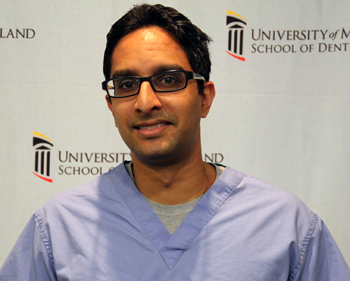 Could diabetes slow the healing process of patients who receive endodontic therapy? Tontesh Tawady, DDS, an endodontics resident at the University of Maryland School of Dentistry (UMSOD), has launched a research project to find out.
Could diabetes slow the healing process of patients who receive endodontic therapy? Tontesh Tawady, DDS, an endodontics resident at the University of Maryland School of Dentistry (UMSOD), has launched a research project to find out.
Tawady recently received a $14,400 grant from the American Association of Endodontists Foundation to support his project, “The Relationship between Short-Term Healing of Periapical Lesions and Glycemic Control.” The grant will fund a clinical study in which Tawady will examine how patients’ glycosylated hemoglobin levels impact their overall healing time. Glycosylated hemoglobin levels, also known as HBA1c, are used to measure blood glucose levels and diagnose diabetes.
He will study these levels in patients who receive root canal treatment of teeth with peri-apical lesions, which are dental infections caused by degenerated pulp tissue. Tawady will take radiographs after the initial treatment and during a six-month follow-up visit, and then compare the results to see how quickly healing has progressed. He will cross-reference these results with the patients’ HBA1c levels to see if any correlation exists.
This project is especially timely due to the increasing prevalence of this chronic disease, he says. The American Diabetes Association reports that 9.3 percent of the U.S. population had diabetes in 2012. “There are so many patients who come in for treatment and don’t even know that they have diabetes,” Tawady says. “A lot of research has been done on the effects diabetes has on periodontal conditions, but not many studies have focused on endodontics, so this is an important project.”



